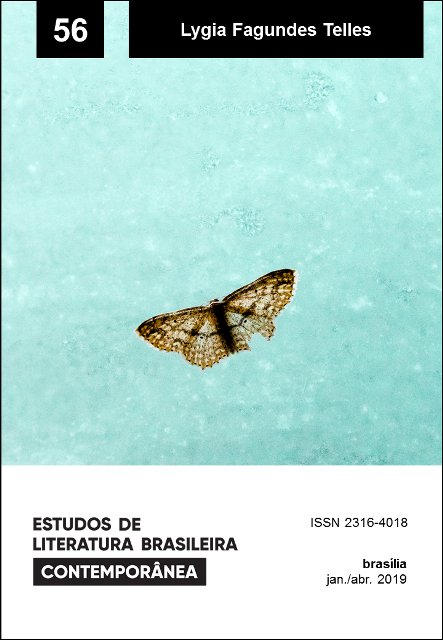Old age’s muzzled sorrows in Lygia Fagundes Telles and Clarice Lispector
DOI:
https://doi.org/10.1590/2316-40185611Keywords:
old age, Brazilian literature, modes of subjectivationAbstract
This article aims to show the concept of old age in Brazil of the seventies through the analysis of “Senhor Diretor” and “A partida do trem”, two short stories written by Lygia Fagundes Telles (1977) and Clarice Lispector (1974), respectively. To do so, we did a bibliographical survey and, based on theorists such as Ferreira (2014) and Beauvoir (1990), among others, we analyzed psychologically and literarily the characters Maria Emília and Maria Rita, the protagonists of the short stories mentioned above. By placing them alongside each other, we see how aging can be marked by negative modes of subjectivation that cause suffering due to rejection, low self-esteem, loneliness, the introjection of preconceived notions, denial of sexuality, and hopelessness. And while the short stories reinforce these socio-historically constructed standards, this research is also relevant in showing old age under a prism of fullness and a search for meaning in life.
References
BEAUVOIR, Simone de (1990). A velhice. 4 ed. Rio de Janeiro: Nova Fronteira.
BUBER, Martin (1979). Eu e tu. Introdução e tradução de Newton Aquilles Von Zubben. 2 ed. São Paulo: Cortez e Moraes.
FARIAS, Rafaela Felex Diniz Gomes Monteiro de (2007). A disciplina do corpo feminino em “Senhor Diretor”, de Lígia Fagundes Teles. Revista Fórum Identidades, Itabaiana, v. 2, n. 2, p. 1-7, jul./dez.
FERREIRA, Josye Gonçalves (2014). Velhice desejante: sexualidade e envelhecimento na ficção de Lygia Fagundes Telles. Dissertação (Mestrado em Letras) ”“ Universidade Estadual de Montes Claros, Montes Claros/MG.
FIGUEIREDO, Adriana Giarola Ferraz (2011). A problemática da mulher de terceira idade em contos de Clarice Lispector: uma leitura de “A partida do trem”. Anais do SILEL, v. 2, n. 2. Uberlândia: EDUFU, p. 1-6.
FOUCAULT, Michel (1999). História da sexualidade humana 1: A vontade de saber. Tradução de Maria Thereza da Costa Albuquerque e J. A. Guilhon Albuquerque. 13 ed. Rio de Janeiro: Graal.
FOUCAULT, Michel (2007). Vigiar e punir: nascimento da prisão. Tradução de Raquel Ramalhete. 34 ed. Rio de Janeiro: Vozes.
FRANKL, Viktor Emil (2015). Em busca de sentido: um psicólogo no campo de concentração. 25 ed. São Paulo: Vozes.
FREUD, Sigmund (1987). Luto e melancolia [1917]. In: FREUD, Sigmund. Edição standard brasileira das obras psicológicas completas de Sigmund Freud. Rio de Janeiro: Imago. v. XIV.
IRIGARAY, Tatiana Quarti; SCHNEIDER, Rodolfo Herberto (2007). Prevalência de depressão em idosas participantes. Revista de Psiquiatria do Rio Grande do Sul, Porto Alegre, v. 29, n. 1, p. 19-27, jan./abr.
LISPECTOR, Clarice (1974). Onde estivestes de noite. Rio de Janeiro: Francisco Alves.
PEDRA, Mabel Knust (2010). Sombra silenciosa: impotência e solidão em dois contos de Lygia Fagundes Telles. Darantina Revista Eletrônica, Juiz de Fora, v. 1, n. 1, p. 1-15.
PRAZERES, Lílian Lima Gonçalves dos (2015). Femininos, identidades e trânsitos em narrativas de Clarice Lispector. Dissertação (Mestrado em Letras) ”“ Centro de Ciências Humanas e Naturais, Universidade Federal do Espírito Santo, Vitória/ES.
PRAZERES, Lílian Lima Gonçalves dos; MIGLIEVICH-RIBEIRO, Adelia (2017). Processos de libertação (descolonização) no conto “Partida do trem”, de Clarice Lispector. Antares ”“ Letras e Humanidades, Caxias do Sul, v. 9, n. 8, p. 172-194.
RABELO, Sebastião Augusto (2009). O narrador: do tradicional ao moderno. Revista Eletrônica Via Litterae, Anápolis, v. 1, n. 1, p. 240-255.
SOUZA, Rinaldo Pereira de (2013). O ser da mulher idosa na literatura: entre o sagrado e o profano. Dissertação (Mestrado em Letras) ”“ Pontifícia Universidade Católica de Goiás, Goiânia.
TELLES, Lygia Fagundes (1997). Seminário dos ratos. São Paulo: Companhia das Letras.
ZIMERMAN, Guite (2000). Velhice: aspectos biopsicossociais. Porto Alegre: Artmed.
Downloads
Published
Issue
Section
License
Authors who publish in this journal agree to the following terms:
a) The authors maintain the copyright and grant the journal the right of first publication, the work being simultaneously licensed under the Creative Commons Attribution License-Non Commercial 4.0 which allows the sharing of the work with acknowledgment of the authorship of the work and publication this journal.
b) Authors are authorized to enter into additional contracts separately, for non-exclusive distribution of the version of the work published in this journal (eg publish in institutional repository or as a book chapter), with authorship recognition and publication in this journal.
c) Authors are allowed and encouraged to publish and distribute their work online (eg in institutional repositories or on their personal page) after the editorial process, as this can generate productive changes, as well as increase the impact and citation of published work (See The Effect of Free Access).
d) The authors of the approved works authorize the magazine to, after publication, transfer its content for reproduction in content crawlers, virtual libraries and the like.
e) The authors assume that the texts submitted to the publication are of their original creation, being fully responsible for their content in the event of possible opposition by third parties.


